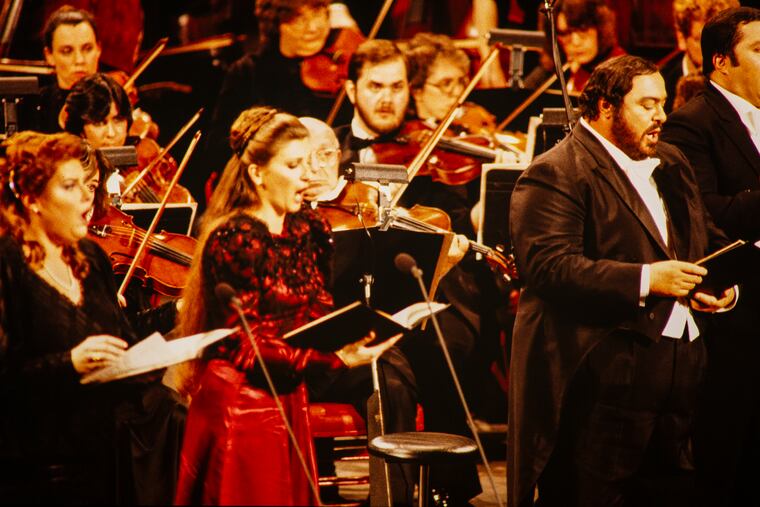Opera Philadelphia will stage Verdi’s ‘Requiem’ for the first time since Pavarotti sang it at the Spectrum
Fifteen of the musicians who were in the orchestra then are still with the Opera Philadelphia Orchestra for this weekend's performances at the Academy of Music.

If Luciano Pavarotti ever had a perfect moment in his years with Opera Philadelphia, it was the 1986 Verdi Requiem telecast on PBS from the now-demolished Spectrum. No matter that the venue more regularly hosted hockey, basketball, and Bruce Springsteen — Pavarotti and company still hold up in the performance, which is now posted on YouTube.
Now, after a distance that’s safe from comparison, Opera Philadelphia returns to the Verdi Requiem, this time Jan. 31 and Feb. 2 at the Academy of Music. The piece reappears in 2020 carrying vivid memories for 15 current Opera Philadelphia musicians, now in their 60s or older, who also played the piece the last time around.
“Fun,” “amazing,” and “bizarre” are among the diverse descriptions of the Pavarotti event, and that’s just from clarinetist Allison Herz.
“I’m surprised at how good it sounds," added bassist Miles B. Davis. "The brass were thrilling.”
“And the chorus was all over the place,” said Herz. As it had to be.
In this most operatic of requiems, the upcoming Academy performances under Corrado Rovaris will have 100 voices to convey the horrific fires of hell in passages portraying the last judgment — and that’s standard. But the Spectrum’s audience of 17,000 needed a 350-voice chorus to project the piece’s terror and grandeur. That meant combining several choral organizations in Philadelphia and importing more from Baltimore.
What made it the perfect Pavarotti moment: The music could've been written for his voice.
And this time the 50-ish superstar wasn’t trying to pass himself off as a starving artist in La Boheme. In fact, Pavarotti’s legendary girth had progressed to the point where he navigated the expansive backstage of the Spectrum in a golf cart and honked the horn with his belly, recalled violinist Charles Parker.
The crew humored Pavarotti’s long-standing preperformance superstition about finding a bent nail on the floor for good luck: Many were left in conspicuous places.
Some opera companies are known to coast on the strength of their superstar. Opera Philadelphia surrounded the tenor with the best for that April 5 concert in ’86, later broadcast on June 11 as “Pavarotti in the Verdi Requiem: a Salute to Youth.”
Behind the scenes, director Kirk Browning was a seasoned name in fine-arts programming. James Lock was considered one of England’s great sound engineers.
Soprano Susan Dunn soared effortlessly up to some of the most feared high notes in her repertoire, and with great emotional conviction. Russian bass Paata Burchuladze supplied the gravitas.
But the key musician was the late conductor Lorin Maazel, who was not often heard in Philadelphia but knew how to marshal large forces in unconventional performance conditions. Though the opera company had good conductors such as Serge Baudo, Maazel was a cut above them. Violinist Emma Kummrow, one of the Opera Philadelphia musicians in the pit then and now, described herself as having been “absolutely enthralled” during rehearsals at the Academy of Music.
“Rehearsals were incredibly meticulous,” said violinist Parker. “He worked so hard to have the most beautiful pianissimos. The winds were getting annoyed because he kept saying ‘Less! Less!’ He wouldn’t accept anything less than what he wanted … and was getting an incredibly beautiful sound. But then when we got to the Spectrum, we couldn’t be heard over the fans for the heating and air-conditioning. And they wouldn’t turn them off.”
One crucial link was the dress rehearsal at the Spectrum, shot with the musicians in full concert dress — as a backup for any mishaps that might happen in the live performance. Timpanist Martha Hitchins, a striking presence who would be easily picked out of the crowd, typically took extra care to make sure her hair and jewelry were identical in rehearsal and performance. It was yet another thing to think about as Maazel had her mastering alternative timpani parts.
Nobody remembers any significant hitches. The camera shows Pavarotti being particularly attentive to reading his score — reopening the ages-old debate whether or not he could read music. Hitchins has an in-between theory: “He had something up there,” she said, “whether they prepared scores just for him.”
One thing common in the memories of the musicians was the glory of the Pavarotti voice, with its immediately recognizable vibrancy.
The other reaction was how the telecast is a snapshot of who they were in 1986 — half-a-lifetime ago. Some musicians enjoy return glimpses of long-ago friends and former lovers. But Kummrow could only take five minutes of it: “Oh my god! We were all so young!”
OPERA
Verdi’s “Requiem”
Opera Philadelphia production Jan. 31 and Feb. 2 at the Academy of Music, 240 S. Broad St. Corrado Rovaris conducts the Opera Philadelphia Orchestra and Chorus with soloists Leah Crocetto, Daniela Mack, Evan LeRoy Johnson, and In-Sung Sim.
Tickets: $30-$219
Information: 215-732-8400 or operaphila.org.